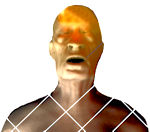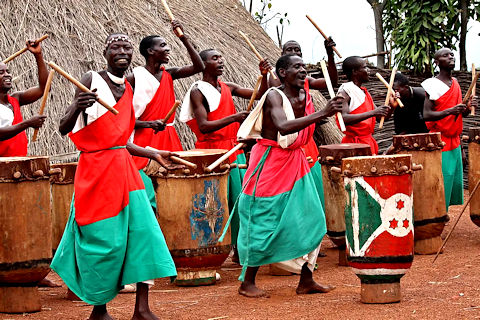More Corrections

I was born before the sun. I wandered in the blackness before there was light. I was reborn as an orphan not knowing who begot me. For many years I roamed a strange land devoid of life save mine. Finally I coalesced in a village with other sentient beings like me. We were trained in ancient arts, and we were punished when we failed to satisfy our master. After our training was complete, each of us was given a mission and sent on our separate ways.
I have been to many places and made the corrections I was entrusted to do. Now I am here not knowing this place but knowing what I must do.
"So where am I?" Jēḍu asked the young black man standing in front of him.
"You are in Burundi," the black man answered, showing a charming smile and pure white teeth. "You just appeared from nowhere. You have a strange appearance. Are you a god?"
"No," replied Jēḍu
"Are you a ghost? A demon?"
"No, I am just what I am."
"How is it that you can speak my language?" asked the black man.
"I speak all languages."
"Very well. Amashyo! (May you have herds of cattle.) I am Hutu. My name is Joseph. I will take you to my village if you like."
"Yes, please." Jēḍu said.
As they were walking along the dirt road to the village Jēḍu saw a water pipe that brought water from the lake to the village. It was leaking badly.
"Wait," said Jēḍu. "I must make a correction." Then he separated the pipe at its junction. He ignored the water gushing out of the pipe as he repaired the threads of the pipe's ending with his fingernails. He reconnected the two ends of the pipe. The leak stopped immediately.
After entering the village, Jēḍu was introduced to the tribal elders. They were leery of him. Some recoiled in fear. But many of the children surrounded him, smiling, dancing, and waving their arms. He picked up a young girl and lifted her up until her face met his.
"Bring her mother to me," Jēḍu said.
She came forward, trembling.
Jēḍu sad to the mother, "This child needs a correction, referring to her club foot. I will repair her foot if you will allow it."
She nodded in agreement. He then placed the child on the ground, knelt down, and placed his hands around her deformed foot.
An elder came forward and said, "Stop! You have no right to change this child. Mungu (God) made her the way she is, and she will remain so."
Jēḍu replied, "I do not believe in your god, but I do believe in the child's mother. If you interfere, I will destroy you."
The elder trembled in fear and slowly backed away.
Jēḍu resumed tending to the child. He sat with her for a very long time, massaging and moving her foot. Her mother looked on. Finally Jēḍu released the child. Her foot was normal. The child and her mother began crying loudly. Other members of the tribe stared in disbelief.
"I must rest now," said Jēḍu. He went to the periphery of the village and lay down on the ground.
While he was sleeping the tribal elders met and discussed the change that had occurred since Jēḍu entered their village. A few of them said he was a blessing, but the rest said he was dangerous and must leave. One was selected to confront the stranger.
As Jēḍu was waking up, the appointed elder approached him and said, "You have helped one of our children since you entered our village, but we fear you. You are not Hutu or even a man. You could cause us great harm. We want you to leave our village."
Jēḍu arose and said, "As you wish." Then he went to the road to the village and began walking back to where he had appeared.
Along the way he saw a dying fawn on the side of the road. He went to it to perform a correction. Other deer approached and watched him. He held the fawn in his arms. Then he went into a deep trance for several hours. When he emerged, the fawn showed signs of life. It opened its eyes and stirred. After a while it got up and ran over to the other deer.
Jēḍu continued walking along the road.
Up ahead he saw an armored vehicle with heavily armed men aboard.
Joseph, who had been following Jēḍu, ran up to him and said, "You must run or they will kill you. These men are here to destroy our village as they have destroyed many other villages in our country. These mercenaries work for a powerful mining company that wants our land in order to extract gold, nickel, copper and rare earths. Please we must run!"
Jēḍu relied, "Joseph, return to your village. I will make a correction."
As he approached the vehicle, one of the men shouted out, "Get out of our way you freak of nature or we will kill you."
Jēḍu stood still in the middle of the road and slowly raised his arms and clasped his hands together. His entire body slowly turned into stone.
One of the mercenaries shouted, "Run over the bastard!"
The vehicle struck Jēḍu and was destroyed. He remained standing in the road. The men jumped out of the vehicle and opened fire with their automatic rifles until they spent all of their ammunition. Jēḍu remained standing in the road. He slowly unclasped his hands and lowered his arms as his body returned to its natural state.
Jēḍu said, "You may leave unharmed. If you stay, I will destroy you."
The mercinaries stood their ground. Jēḍu's hands transformed into razor sharp blades. He ran among them slashing their bodies with his hands until all of them died, save one. Jēḍu picked him up and said, "Tell your master if he sends any more soldiers, I will kill all of them. Then I will find him and cut out his eyes. Go!"
Joseph, who had been watching from a safe distance, ran back to the village to tell the others what had happend.
Jēḍu slowly returned to the village and sat down on the ground to rest. All of the members of the tribe encircled him and began singing and dancing. The child whose foot he had healed ran over to him and sat down in his lap. He embraced her and began gently caressing her cheek. As he continued caressing her, he began to fade until he was gone.
